
https://www.youtube.com/watch?v=I3vurKIiGDw
Can High Doses of Potassium Be Toxic
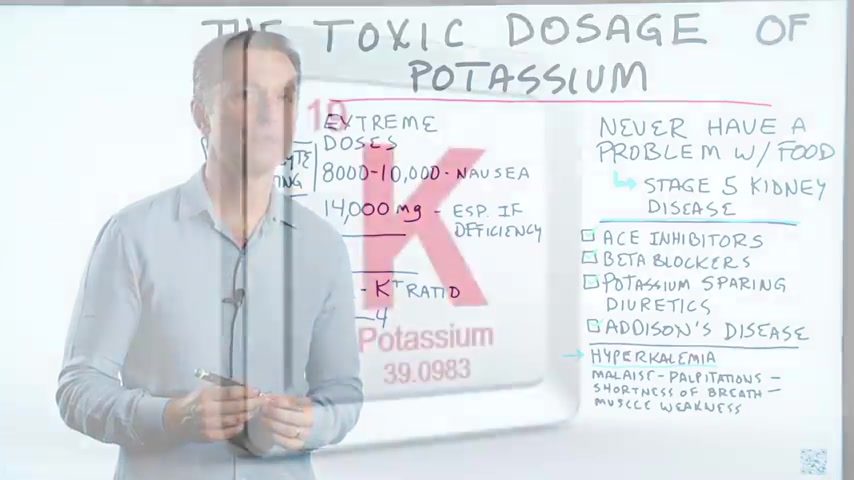
So is there such a thing as a toxic dosage of potassium ?
Let's talk about that .
Now the first thing to know is that you will rarely , if ever , have a problem with potassium if you get it from food .
I'm talking about 7 to 10 cups of vegetables per day .
Unless you have stage 5 kidney disease .
If the kidney is damaged , if you're having a chronic kidney problem , you're not gonna be able to filter out potassium like you should and it can build up and create a lot of problems with your body .
Also if you're taking large amounts of potassium and you're on a ACE inhibitor which is a blood pressure medication or a beta blocker or a potassium sparing diuretics , trying to lower your blood pressure .
Or you have Addison's disease which is rare but it's a complete adrenal burnout and you're taking a lot of potassium , it could exaggerate the symptoms .
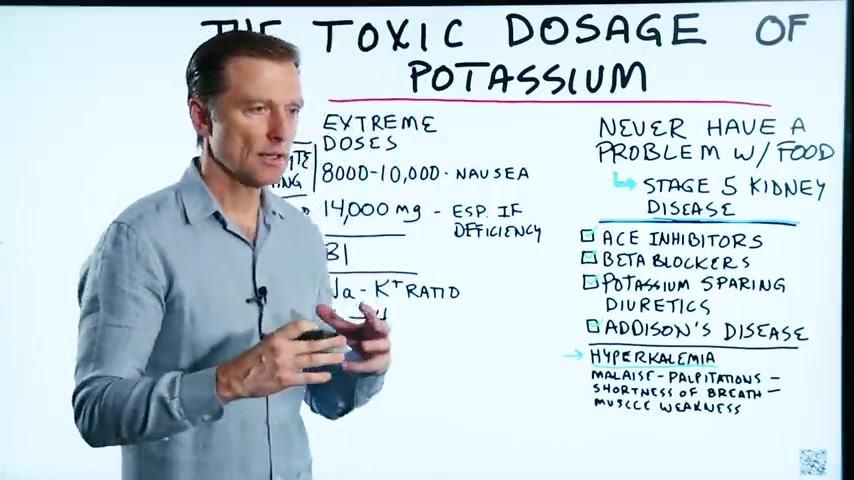
There is a condition called hyperkalemia which is a problem in the blood where you have too much potassium .
And the symptoms would be malaise , palpitations , shortness of breath , muscle weakness .
Now let's talk about the extreme dosage and when the bee starts becoming toxic .
When you go between 8 , 000 to 10000 milligrams , you're gonna start feeling nauseous .
Okay .
Nausea is probably the first symptom you're gonna get .
But the real toxic effect of of Potassium happens right around 14 , 000 milligrams .
Especially if you're deficient in Potassium and you take that much potassium at 1 time .
It could be very very dangerous .
But realize that to do this you'd have to take a lot of potassium .
Even if you took straight potassium in a teaspoon , which is about 1 , 000 to maybe 25 100 milligrams .
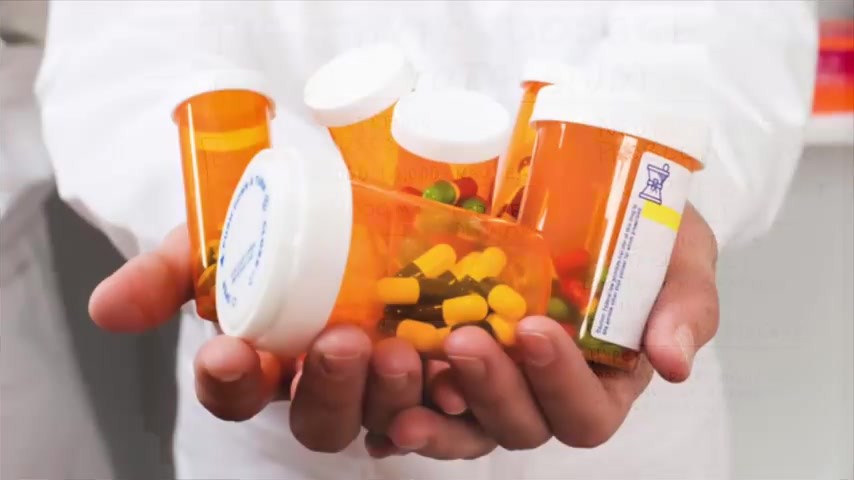
You would have to take about 10 to 14 of those before this effect was achieved .
So basically what I'm telling you it it is very rare to have a toxic effect of Potassium if your kidneys are healthy and you're not on these medications .
Couple more points about potassium .
Potassium is not generally stored in the body .
So when you do prolonged fasting , okay , you can run out of potassium .
And for that reason , I do recommend when you're doing prolonged fasting is you do electrolyte fasting , where you're doing water and electrolytes while you're fasting .
That way you could prevent that problem .
Because you're not just taking potassium , you're taking all the electrolytes .
Another point , if you are deficient in B 1 and you take a tremendous amount of potassium , that can exaggerate the symptoms .
Of course , this is 1 of the reasons why I always recommend healthy keto because you're taking b vitamins or nutritional yeast with your electrolytes , and you're never gonna have a problem with that .

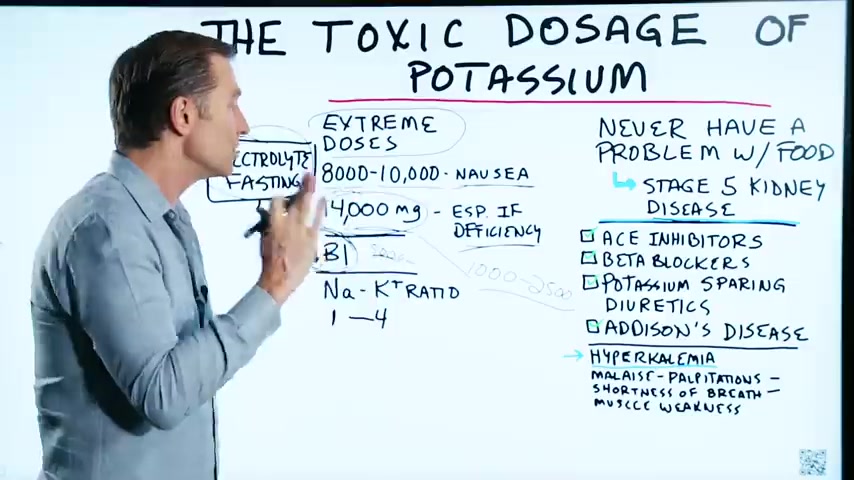
But on the flip side , if you're deficient in potassium and you take a lot of b 1 , let's say 5 , 000 milligrams , you're gonna have exaggerated symptoms from that .
But the point I'm trying to make with this is that these nutrients work in a synergistic effect .
Any time you take a tremendous amount of 1 nutrient and not the other ones , you can create a problem .
And that goes for this , the sodium and potassium ratio which is a little more important than just these minerals individually .
For example , if you consume a lot of potassium without sodium , that's gonna be a problem .
If you consume a lot of potassium with the right ratios of sodium , problem solved .
Same thing goes with , let's say , you're on a high salt diet and those symptoms from going on a high salt diet disappear when you take more potassium .
So the point is when you take 1 without the other , there's a problem .
So the more sodium you take , the more potassium you're gonna need .
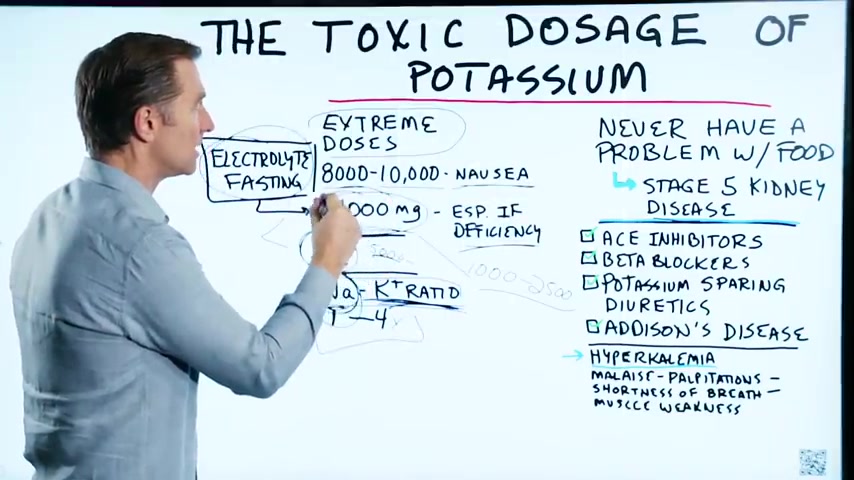
The more potassium you take , the more sodium you're gonna need .
But realize that's a 1 to 4 ratio so you need 4 times as much potassium as sodium .
And that's why they work together .
And when you're going to the doctor for blood pressure problems or heart problems , they're always putting you on a sodium restrictive diet .
What they should do is just simply add more potassium .
That decreases the toxic effect of sodium .
So in summary , you would have to consume a tremendous amount of potassium to create a problem .
If you're consuming 1 , 2 , 3 or 4000 milligrams of potassium a day , you're not gonna have a problem .
But when you get higher , 8 , 000 , 10000 , you start experiencing symptoms .
And of course if you're going even higher than that , you potentially could have a problem as well but it's very rare .
Alright .
Thanks for watching .
So if you want more knowledge on how to create a healthy body , subscribe now and get daily notifications .
Are you looking for a way to reach a wider audience and get more views on your videos?
Our innovative video to text transcribing service can help you do just that.
We provide accurate transcriptions of your videos along with visual content that will help you attract new viewers and keep them engaged. Plus, our data analytics and ad campaign tools can help you monetize your content and maximize your revenue.
Let's partner up and take your video content to the next level!
Contact us today to learn more.